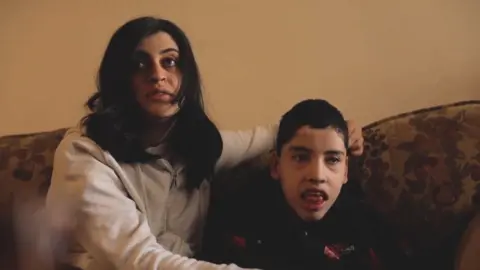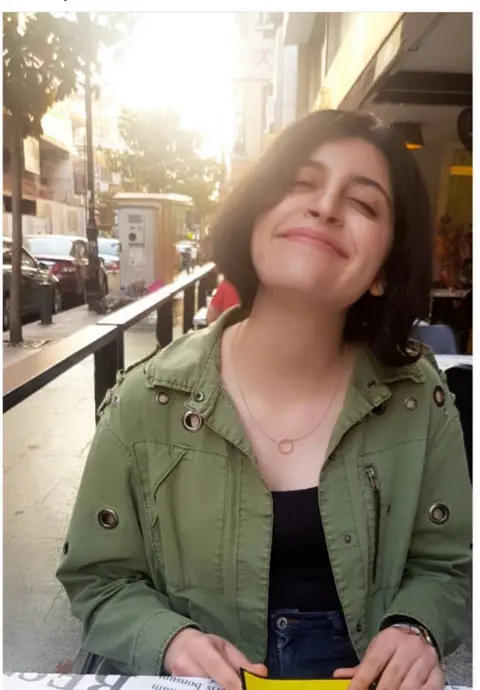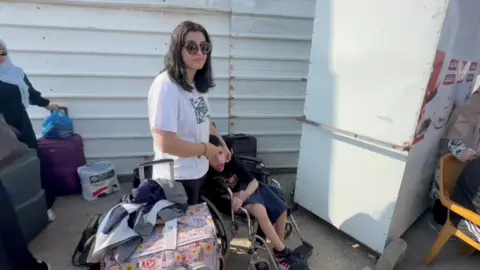Israel-Gaza war: Relief and guilt after Gazans find safety in Egypt
 BBC
BBCThey cried all the way.
Tala Abu Nahla, her mum, and little sister. Tala's brother Yazeed, aged 17, could feel their emotion. He is disabled and has epileptic seizures. She calmed him in the way she knew how. Tala spoke softly and caressed his hands and pushed him across the border in his wheelchair.
"It was really hard because it felt like we were leaving part of us in Gaza," she says.
All she could do was keep looking at the sky. And listening. It was the same sky but here in Egypt all the dread was gone, and they'd left behind the possibility of sudden and brutal death.
"When we went to the other side… I couldn't hear drones anymore. And I knew I wouldn't be hearing bombing anymore or airstrikes."
It was late at night and Tala remembers being amazed by the electric light. Back in Rafah there was no power supply to light their house.
They had tried to get into Egypt three times before. We first spoke with Tala in November, when the Israeli offensive was only a few weeks old, but the death toll was already in the thousands and desperate crowds were gathered at the border.
"We're trying to survive," Tala said then. "We're not sure we're going to make it, but I simply don't want to die aged 24."
Tala's mother was the only foreign passport holder - she is a Jordanian citizen and could have crossed. But the authorities would not allow her children to go with her. So the entire family stayed in Rafah. But last week the border guards relented and allowed them to enter Egypt.
"It felt really surreal that I was safe," Tala says.
Tala is articulate and thoughtful. She was awarded a grant to study in America and lived for a year in Colorado "with an amazing American host family."
She also won a scholarship under the state department's Tomorrow's Leaders programme, and holds an honours degree in Business Studies from the American University in Beirut. Back in Gaza she had been contemplating career possibilities when Hamas launched its attack on Israel on 7 October.
Her Instagram account tracks the progress of a life upended by war - from the photo of a smiling young woman sitting outside a Beirut café captioned "when you let the light in, shattered glass will glitter", to the image of the home now left behind in Rafah and the caption "we bleed the same stories no matter how far we are from you Gaza. We leave you, but you never leave us."

After each rejection at the Egypt border, Tala took Yazeed home, knowing that supplies of the medicine he needs to suppress his seizures were running lower.
The war has exacerbated an already difficult situation for disabled people in Gaza, where an estimated 21% of households have at least one member living with a disability. That amounts to approximately 58,000 people according to the Palestinian Central Bureau of Statistics run by the Palestinian Authority, the Palestinians' governing body based in the occupied West Bank
There was no running water and food was getting harder to find as the Israel Defense Forces advanced and tens of thousands of frightened refugees crammed into Rafah from further north in the Gaza Strip. In December, as the Gaza death toll passed 20,000, Tala told the BBC of her relief at surviving each airstrike in the area.
"Every time I hear a rocket or bomb that's going to drop on people… it's horrible to say this, but it sort of it gives me this relief that it's not us."
The air strikes could not be explained to Yazeed. They were something he experienced as a malign, elemental force.
Tala explains: "He would have a seizure every time he heard bombing. And it got really scary like his body and his mind is not able to understand everything that's going on, and then having to deal with the seizures without even medication. I think it was really heart-breaking for all of us."
Now she lives in a bustling city where food and medicine are close at hand. But Tala cannot stop thinking of the people left behind in Gaza.
"I don't think I've felt this guilty before," she says. "I think this is one of the hardest feelings to talk about. I think every time I see a plane or hear a plane, and I know I'm going to be safe after hearing it, I feel guilty.
"Every time I have food to eat, or I don't have to go running for water or oil, knowing that everything is available it makes me feel guilty. I think about everyone in Gaza, the 1.2 million people who are displaced and who right now are not even sure where to go if the military invasion happens in Rafah."
In the sitting room of their rented apartment in Cairo, the rest of her family is watching the news from Gaza on television. But Yazeed looks like a different young man. The acute strain is gone from his face.

After months wondering if they would survive, the family must now plan for the immediate future.
"Back then it was not about future plans or anything, it was 'we want to stay alive? How are we going to do it?'" For now, the imperative is to find a doctor for Yazeed and education for Tala's younger sister.
Tala is determined that she will go back to Gaza.
"I don't know how long it's going to take. But I definitely want to go back, and I want to rebuild. I'm not sure if it's going to be the same, but I guess with the history that each one of us has, going through what we never wanted and surviving it, I think we'd be able to rebuild it with all that strength."
Tala goes to the window and looks out at the blue of the Cairo sky. It is a sky without menace, but she can never forget that it is not the sky of home.
Additional reporting by Haneen Abdeen, Wael Hussein and Alice Doyard.